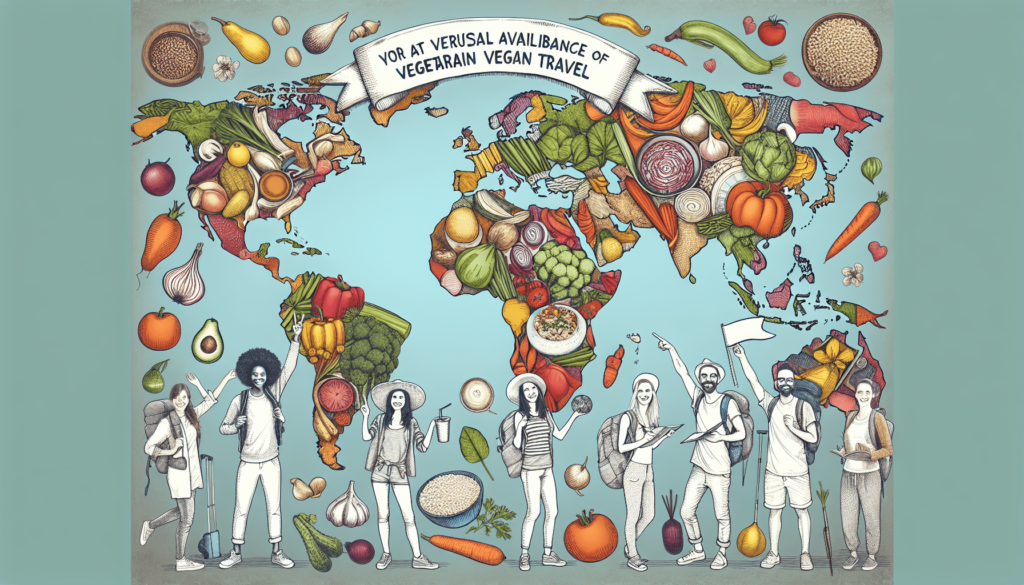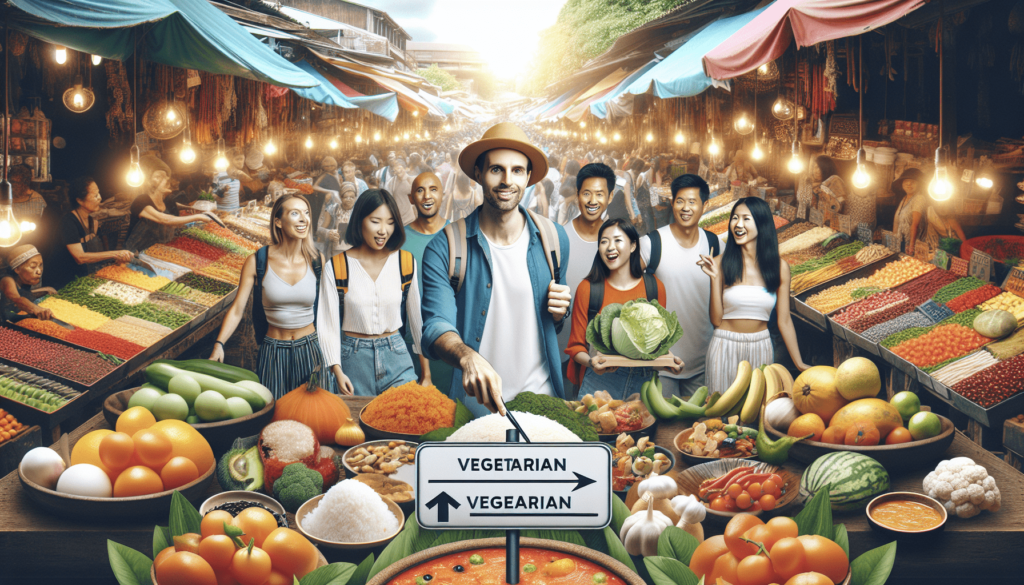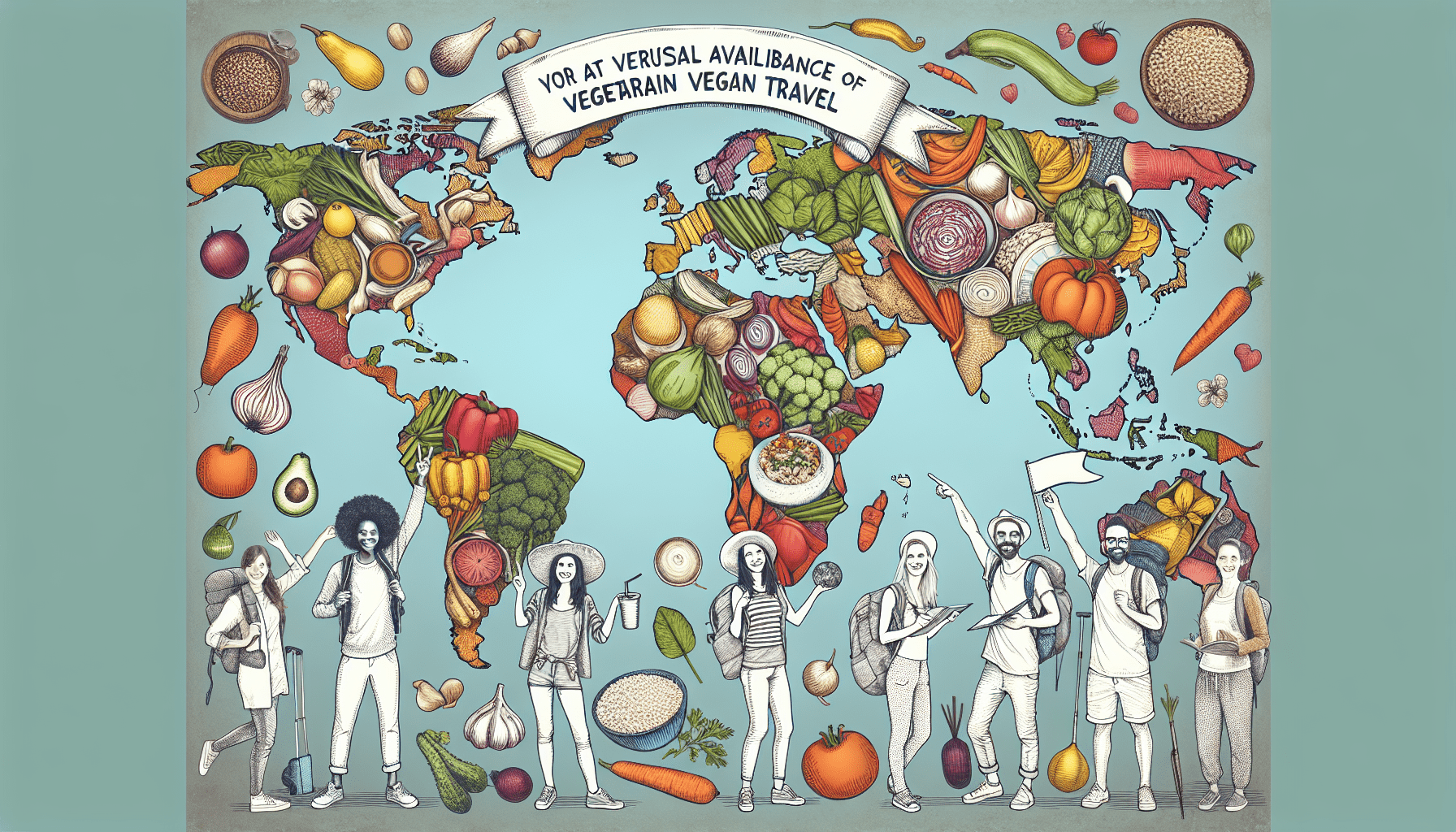Are you a vegetarian or vegan who loves to travel? Navigating new cities and foreign cuisines may seem daunting, but fear not! This article will provide you with invaluable tips and tricks on how to travel seamlessly as a vegetarian or vegan. From finding plant-based options in traditional restaurants to locating specialized vegan-friendly eateries, we’ve got you covered. So pack your bags and get ready to embark on a culinary adventure that caters to your dietary preferences. Bon appétit!
Meal Planning
When it comes to travel, one of the most important aspects to consider as a vegetarian or vegan is meal planning. Researching local cuisines and dishes can give you a good understanding of the vegetarian and vegan options available in your destination. By knowing what to expect, you can make informed choices and ensure that you’ll be able to enjoy delicious and satisfying meals throughout your trip.
Another essential aspect of meal planning is finding vegetarian or vegan-friendly restaurants and cafes. Thanks to the growing popularity of plant-based lifestyles, many cities around the world now offer a plethora of options for those who choose to abstain from animal products. Take advantage of online resources, such as review websites and vegan/vegetarian restaurant guides, to find the best places to dine according to your dietary preferences.
In addition to dining out, it’s also a good idea to pack snacks and non-perishable foods. Having these provisions on hand will not only keep hunger at bay but will also come in handy in case you find yourself in an area with limited vegetarian or vegan options. Nuts, seeds, dried fruits, energy bars, and instant noodles are just a few examples of portable, non-perishable foods that can be easily packed and enjoyed on the go.
Accommodation
Choosing accommodation with cooking facilities can significantly enhance your vegetarian or vegan travel experience. Having access to a kitchen gives you the freedom to prepare your own meals with locally sourced ingredients. This can be especially beneficial if you have specific dietary needs or allergies. Look for accommodations that provide the necessary appliances and utensils to make cooking a breeze.
If cooking isn’t your forte or you simply prefer the convenience of dining out, consider staying at hotels that offer vegetarian or vegan options on their menus. Many establishments now cater to the increasing demand for plant-based meals and have expanded their offerings accordingly. Prioritize accommodations that prioritize your dietary preferences, and you’ll never have to worry about finding suitable meals.
Another option to consider is booking through vegetarian or vegan travel agencies. These specialized agencies can provide valuable insights and recommendations, ensuring that your travel arrangements align with your ethics and lifestyle. They may offer curated itineraries, personalized guidance, and access to exclusive experiences specially tailored for vegetarian and vegan travelers.

Local Knowledge
When traveling to a new destination, it’s helpful to learn common phrases that can communicate your dietary restrictions. Being able to express phrases like “I am vegetarian” or “I don’t eat meat or dairy products” in the local language can assist you greatly in communicating your needs to locals and restaurant staff. Language learning apps or phrasebooks can be extremely useful for this purpose.
To further enhance your vegetarian or vegan travel experience, ask for recommendations from locals or online communities. Locals can provide firsthand knowledge and insider tips on the best vegetarian and vegan-friendly establishments in the area. Engaging with online communities, such as social media groups or forums, can also connect you with like-minded individuals who can provide valuable insights and advice based on their own experiences.
Additionally, be sure to check for vegetarian or vegan food guides of your destination. These guides are often created by locals or experienced travelers and can be a treasure trove of information. They may include lists of recommended restaurants, specialty stores, and even hidden gems that may not be widely known to the general public. By arming yourself with these resources, you can feel confident in finding the best vegetarian and vegan options available.
Air Travel
When traveling by air, it’s important to inform the airline of your dietary preferences well in advance. Most airlines offer special meal options, including vegetarian or vegan meals, but these need to be requested ahead of time. By notifying the airline of your requirements, they can ensure that appropriate meals are prepared and available for you during your journey.
In addition to requesting special meals, packing your own meals and snacks for the journey is highly recommended. Airline meals may not always cater to your dietary needs or may be limited in options. By bringing your own food, you can ensure that you have a satisfying and delicious meal on board. Fresh fruits, sandwiches, wraps, and energy bars are all great options to consider.
Before your trip, it’s also worth checking if the airline offers vegetarian or vegan options for in-flight meals. Some airlines have embraced the rise in plant-based diets and now offer a range of options to suit various dietary preferences. This information can usually be found on the airline’s website or by contacting their customer service directly.

Transportation
When it comes to other modes of transportation, such as trains or buses, it’s essential to research the availability of vegetarian or vegan meals on board. Some long-distance or international train and bus services may offer vegetarian or vegan options, while others may have limited or non-existent options. By planning ahead, you can determine if it’s necessary to pack your own meals or snacks for the journey.
Packing food for long journeys can be a lifesaver, especially when traveling through areas with limited vegetarian or vegan options. Consider bringing items that are easy to eat on the go, such as sandwiches, fruits, granola bars, or pre-packaged meals. This way, you won’t have to rely solely on the offerings provided during your journey.
In transportation hubs, such as airports or train stations, explore the vegetarian or vegan food options available. Many transportation hubs now recognize the demand for plant-based meals and have introduced dedicated food outlets or concession stands that cater to those with dietary preferences. Take the time to seek out these establishments, ensuring that you have access to nourishing and delicious meals while traveling.
Language Barrier
Dealing with a language barrier can be challenging, especially when trying to communicate dietary preferences. To overcome this hurdle, carrying a printed card explaining your dietary preferences can be immensely helpful. The card should clearly state that you are vegetarian or vegan, and list any specific ingredients that you avoid. This way, you can simply present the card to restaurant staff when ordering, eliminating potential misunderstandings.
Technology can also be a useful tool in bridging the language barrier. Translation apps, such as Google Translate, can help you communicate your dietary needs effectively. These apps allow you to type or speak phrases in your native language, which are then translated into the local language. While not always perfect, they can help convey your message and ensure that your dietary restrictions are understood.
Learning how to say “vegetarian” and “vegan” in the local language is another effective way to make yourself understood. Even if you don’t have an extensive grasp of the language, being able to communicate these key words can be immensely beneficial. Locals will likely understand your requirements and be able to guide you towards suitable options.
Cultural Sensitivity
When traveling, it’s important to respect local customs and traditions regarding food. Each culture has its own unique cuisine and dietary practices, and it’s essential to approach these with an open mind and respect for local customs. While it’s perfectly valid to adhere to a vegetarian or vegan lifestyle, it’s also crucial to be mindful of and appreciate the cultural significance of certain foods.
To enhance your cultural sensitivity, educate yourself on local ingredients and cooking methods. Familiarize yourself with the staple foods of the local cuisine and understand the dietary preferences and restrictions of the region. This knowledge will not only help you make more informed choices but will also enrich your overall travel experience by providing a deeper appreciation for the local culture.
Be open-minded and adaptable when faced with limited options. Not all destinations may have an extensive range of vegetarian or vegan options, especially in more remote or traditional areas. Embrace the opportunity to try local fruits, vegetables, and other vegetarian dishes that may not typically be part of your everyday diet. By being flexible and open to new experiences, you can discover unique flavors and culinary delights that you may have otherwise missed.
Socializing and Dining Out
Researching vegetarian or vegan-friendly restaurants before your trip can save you a lot of time and effort. Many cities now boast a vibrant plant-based dining scene, with numerous restaurants dedicated to catering to vegetarians and vegans. Use online resources, such as restaurant review websites or vegan/vegetarian directories, to find establishments that meet your dietary preferences and offer a range of appetizing options.
Communicating your dietary restrictions with restaurants in advance is also recommended, especially if you have specific dietary concerns or allergies. Contact the restaurant directly by phone or email and inform them of your requirements. This allows them to prepare accordingly and ensures that you’ll be able to enjoy a satisfying meal when you visit.
For a more immersive experience, consider cooking meals with locals through food-sharing websites or platforms. These websites connect travelers with locals who are willing to open their homes and share their culinary traditions. Not only will you have the opportunity to enjoy a home-cooked vegetarian or vegan meal, but you’ll also gain insights into the local culture and forge meaningful connections with locals.
Emergency Food Options
In case of emergencies or unexpected situations, it’s always a good idea to carry a supply of emergency snacks or meal replacement bars. These convenient and easily transportable options can be a lifesaver when you find yourself in a location without suitable vegetarian or vegan options. Keep a stash in your bag or backpack so that you’re prepared for any situation that may arise.
Researching health food stores or supermarkets that cater to vegetarians or vegans in your destination can provide an additional layer of security. These specialty stores often stock a wide range of vegetarian and vegan products, from fresh produce to plant-based protein alternatives. By knowing where to find these stores, you can rest assured knowing that you can easily replenish your food supplies if needed.
Finally, always keep an eye out for nearby restaurants with vegetarian or vegan options. When exploring your surroundings, take note of restaurants or cafes that display “veg-friendly” or “vegan-friendly” signage. These establishments are typically accommodating and offer a variety of menu choices that cater to plant-based diets. Locals or tourist information centers can also provide recommendations for vegetarian or vegan-friendly eateries nearby.
Seek Local Guidance
Connecting with vegetarian or vegan communities at your destination can be invaluable when seeking local guidance. Social media platforms and online forums are excellent resources for finding like-minded individuals who can offer insights and recommendations based on their own experiences. Engage with these communities during your trip to gain a deeper understanding of the vegetarian and vegan scene in your destination.
Participating in local vegan or vegetarian food tours or cooking classes is another fantastic way to immerse yourself in the local food culture. These organized tours or classes provide a unique opportunity to discover hidden gems and local specialties that may not be easily accessible to the average traveler. Not only will you enjoy delicious meals, but you’ll also gain valuable knowledge and skills that you can take home with you.
To further enhance your travel experience, consider reaching out to vegetarian or vegan blogs, websites, or influencers. These platforms often offer detailed guides, insider tips, and personal recommendations for vegetarian or vegan travelers. They can provide valuable insights into the best restaurants, markets, and food experiences available in your destination, ensuring that you can fully enjoy your travels as a vegetarian or vegan.

